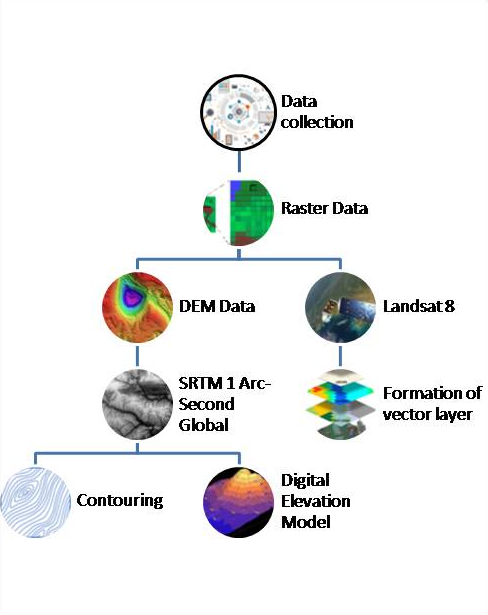Applications of RS & GIS for Tsunami and Sea Surges Risk Assessment Along the Coast of Karachi
Keywords:
GIS, RS, Tsunami, Sea Surges, Karachi, Coastal InundationAbstract
Coastal areas are vulnerable to various hazards, such as storm surges, inundation from sea-level rise or coastal flooding, tsunamis, and more. The situation becomes particularly disastrous if the coast is densely populated and highly developed. Pakistan has a coastline stretching 1,046 km, with Karachi being the most developed part. The Karachi coast faces frequent storms during the monsoon season and is also threatened by rising sea levels in the coming years. Additionally, Pakistan's coastline is near the boundaries of two major tectonic plates—the Indo-Australian and Eurasian plates—as well as two minor plates, the Arabian and Iranian plates. In the event of a major earthquake in the Arabian Sea, a tsunami could pose a significant threat, potentially engulfing important and densely built-up commercial, residential, industrial, and sensitive military areas. This study aims to analyze potential losses due to inundation of the Karachi coast using Remote Sensing and GIS techniques.
References
M. Khan, A. R., Saleem, M., Arif, “Coastal hazards and vulnerability assessment of Karachi coast, Pakistan,” Environ. Earth Sci., vol. 73, no. 3, pp. 1257–1273.
“Mangroves of Pakistan-Status and Management | PDF | Mangrove | Shoal.” Accessed: Jun. 10, 2024. [Online]. Available: https://www.scribd.com/document/97814702/Mangroves-of-Pakistan-Status-and-Management
M. Abid, M., Ashfaq, “Vulnerability of coastal communities to cyclones in Karachi, Pakistan,” Nat. Hazards, vol. 94, no. 3, pp. 1265–1281, 2018.
S. Ahmed, M., Khan, R. A., Ahmed, “Assessment of Vulnerable Areas and Population to Storm Surge in Karachi, Pakistan,” Nat. Hazards.
S. Zafar, M. I., Saeed, “Mapping of Coastal Vulnerability to Sea Level Rise and Storm Surge Flooding in Karachi,” Water, vol. 11, no. 10, 2019.
B. W. Eakins and P. R. Grothe, “Challenges in Building Coastal Digital Elevation Models,” https://doi.org/10.2112/JCOASTRES-D-13-00192.1, vol. 30, no. 5, pp. 942–953, Sep. 2014, doi: 10.2112/JCOASTRES-D-13-00192.1.
D. Hauser et al., “Satellite Remote Sensing of Surface Winds, Waves, and Currents: Where are we Now?,” Surv. Geophys. 2023 445, vol. 44, no. 5, pp. 1357–1446, Mar. 2023, doi: 10.1007/S10712-023-09771-2.
G. Prasad, P. G. Vinod, and S. E. John, “Delineation of ground water potential zones using GIS and remote sensing - A case study from midland region of Vamanapuram river basin, Kerala, India,” AIP Conf. Proc., vol. 1952, no. 1, Apr. 2018, doi: 10.1063/1.5031990/1008195.
P. K. Mishra, A. Rai, and S. C. Rai, “Land use and land cover change detection using geospatial techniques in the Sikkim Himalaya, India,” Egypt. J. Remote Sens. Sp. Sci., vol. 23, no. 2, pp. 133–143, Aug. 2020, doi: 10.1016/J.EJRS.2019.02.001.
D. M. Tralli, R. G. Blom, V. Zlotnicki, A. Donnellan, and D. L. Evans, “Satellite remote sensing of earthquake, volcano, flood, landslide and coastal inundation hazards,” ISPRS J. Photogramm. Remote Sens., vol. 59, no. 4, pp. 185–198, Jun. 2005, doi: 10.1016/J.ISPRSJPRS.2005.02.002.
K. T.S., “Temporal monitoring of forest land for change detection and forest cover mapping through satellite remote sensing,” Proc. 6th Asian Conf. Remote sensing. Natl. Remote Sens. Agency, Hyderabad, pp. 77–83, 1985.
E. S. Brondizio, E. F. Moran, P. Mausel, and Y. Wu, “Land use change in the Amazon estuary: Patterns of caboclo settlement and landscape management,” Hum. Ecol., vol. 22, no. 3, pp. 249–278, Sep. 1994, doi: 10.1007/BF02168853/METRICS.
“Jensen, J.R. (2005) Introductory Digital Image Processing A Remote Sensing Perspective. 3rd Edition, Prentice Hall, Upper Saddle River, 505-512. - References - Scientific Research Publishing.” Accessed: Jun. 10, 2024. [Online]. Available: https://www.scirp.org/reference/ReferencesPapers?ReferenceID=2001065
A. Ahmad and S. Quegan, “Analysis of Maximum Likelihood Classification on Multispectral Data,” Appl. Math. Sci., vol. 6, no. 129, pp. 6425–6436, 2012.
S. L. Ozesmi and M. E. Bauer, “Satellite remote sensing of wetlands,” Wetl. Ecol. Manag., vol. 10, no. 5, pp. 381–402, Oct. 2002, doi: 10.1023/A:1020908432489/METRICS.

Downloads
Published
How to Cite
Issue
Section
License
Copyright (c) 2024 50SEA

This work is licensed under a Creative Commons Attribution 4.0 International License.




















